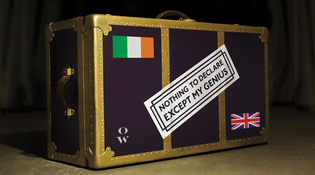 loading
loading
Arts & CultureYou can quote themShaw and Wilde, the great British quote magnets. Yale law librarian Fred R. Shapiro is editor of the <i>Yale Book of Quotations</i>.
 Photo illustration: John Paul ChirdonView full image
Two columns ago, I called Mark Twain the preeminent US “quotation magnet”: so compelling are his wit and fame that he’s often credited with others’ quips. In this issue, we consider two men with claims to be leading UK quote magnets: George Bernard Shaw (1856–1950) and Oscar Wilde (1854–1900). Nigel Rees, compiler of Brewer’s Famous Quotations and many other quote books, has a tongue-in-cheek “Rees’s First Law of Quotation”: “When in doubt, ascribe all quotations to George Bernard Shaw.” It happened even during Shaw’s lifetime; the playwright once complained, “I tell you I have been misquoted everywhere, and the inaccuracies are chasing me around the world.” A classic example of faux Shaviana is a supposed exchange with the dancer Isadora Duncan: she said it was a shame they would never have a child together—“Think what a child it would be, with my body and your brain”—and Shaw retorted, “But suppose the child was so unlucky as to have my body and your brain?” Shaw denied saying this. Tellingly, the earliest known version appears in Lewis and Faye Copeland’s 10,000 Jokes, Toasts, & Stories (1939)—a canon of quotation apocrypha. The same volume quotes another dubious conversation: an unnamed woman said, “What a wonderful thing is youth!” and Shaw replied, “What a crime to waste it on children.” Reader’s Digest provides another of many examples. In 1942, RD attributed to Shaw the remark “England and America are two countries separated by the same language.” Despite assiduous research, quote mavens have not been able to trace this aphorism to any earlier source. But a similar wisecrack (“We have really everything in common with America nowadays, except, of course, language”) appears in the play The Canterville Ghost (1887)—by Shaw’s fellow Anglo-Irish dramatist, Oscar Wilde. Wilde is often ranked with or above Shaw as a British apocryphal quotation source. I believe, however, that Wilde is not a true quote magnet. The essence of the quotation magnet is the ability to attract false attributions, yet attributions to Wilde often have a good claim to truth. It’s frequently said that on his deathbed, Wilde declared the wallpaper in his Paris hotel room so abominable that “Decidedly one of us will have to go.” Some have thought this quip too good to be true. But the earliest variant I have found appeared in a letter William Butler Yeats wrote on December 17, 1908: “This friend of Oscar Wilde told me a strange heroic thing about Wilde. … He was in great poverty, often with not money for food & had declared that it was his wall paper that was killing him. ‘One of us had to go’ he said.” Wilde’s other well-known deathbed remark is “I am dying, as I have lived, beyond my means.” This too has a solid basis. The writer’s close friend Robert Ross wrote to More Adey on December 14, 1900, that Wilde “said he was ‘dying above his means.’” Wilde biographer Robert Sherard specified that he was reacting to a “huge fee” for an operation. Given this record, my view is that other Wildeisms should get the benefit of the doubt. Two classic examples, both first attested in 1916: “Work is the curse of the drinking classes”; and “I have nothing to declare except my genius”—which Wilde allegedly told a New York customs official in 1882. One of the great anecdotal quotations was allegedly said to Wilde. According to the Chicago Daily Inter Ocean, April 4, 1892, Wilde had this exchange with artist and wit James McNeill Whistler: Wilde: “I wish I had said that.” Whistler: “You will, Oscar, you will.”
The comment period has expired.
|
|